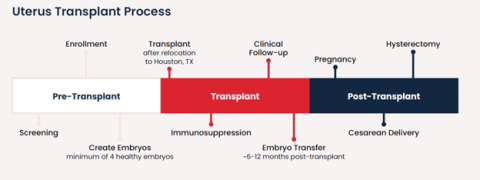
Uterus Transplant Research Program
One in 500 women of childbearing age have a condition known as absolute uterine factor infertility (AUFI), a congenital or surgical absence of a uterus which makes childbirth impossible. Mayer-Rokitansky-Küster-Hauser syndrome, or MRKH, is the main congenital cause of AUFI.
Until 2014, women with AUFI had limited options for expanding their families. Uterus transplant has the potential to benefit women dealing with reproductive challenges, providing a promising avenue for those facing infertility or lacking a uterus.
Thanks to medical and surgical advances, more than 100 uterus transplants have been performed worldwide, with more than 50 occurring within the past 3 years.
About Our Texas Children’s Pavilion for Women and Baylor College of Medicine Research Program
Investigators with Texas Children’s Pavilion for Women and Baylor College of Medicine are among the experts working in the cutting-edge field of uterine transplantation as a treatment option for women with AUFI to help them achieve healthy pregnancies. Our goal is to offer our patients innovative, groundbreaking care consistent with the breadth of our expertise.
Overview of the Uterus Transplant Process
For women who undergo a uterine transplant, the end goal is more than transplantation – it’s giving birth to a healthy baby.
The process of a uterine transplant is complex and involves multiple stages:
- In-depth screening of the recipient
- In-vitro fertilization (IVF) to create a minimum of 4 healthy embryos.
- Transplant the donated (living or deceased) uterus to achieve menstrual cycle.
- Establish pregnancy in the recipient through IVF and monitor closely with frequent labs and clinic follow-ups.
- Successfully deliver a safe live birth via C-section.
- Plan for second pregnancy or removal of the uterus.
- Clinically followed for two years post-explant
The uterus transplant process is summarized in the following graphic:

Locations for Uterus Transplant Procedures
The Uterus Transplant Research Program will provide various phases of care at Texas Children’s facilities: the Legacy Tower, with its expanded operating rooms and the pediatric intensive care unit (PICU) covering four floors, and the Texas Children’s Pavilion for Women. The Pavilion for Women is a designated Level IV maternal care facility and features a Level IV neonatal intensive care unit — the highest level of care available. Its patient care areas include operating and recovery suites, acute care units and the hospital-based Maternal-Fetal Center outpatient unit that serves pregnant women with complicated conditions.
Become a Uterus Donor or Recipient
If you are interested in becoming a uterus transplant donor or recipient, please call the Uterus Transplant Research Program at 832-822-1567 or complete our Questionnaire to see if you are eligible to participate. Our office will contact you by phone or email regarding candidacy.
Become a Uterus Recipient
Women who qualify to become a uterus recipient must meet these criteria:
- Have absolute uterine factor infertility (AUFI), resulting from either congenital or a surgical condition leading to the absence of a uterus
- Biologically female (XX)
- Under 40 years of age
- BMI less than 30
- Willing to relocate to Houston, Texas
- Nonsmoker
- Meets medical criteria suitable for transplant
